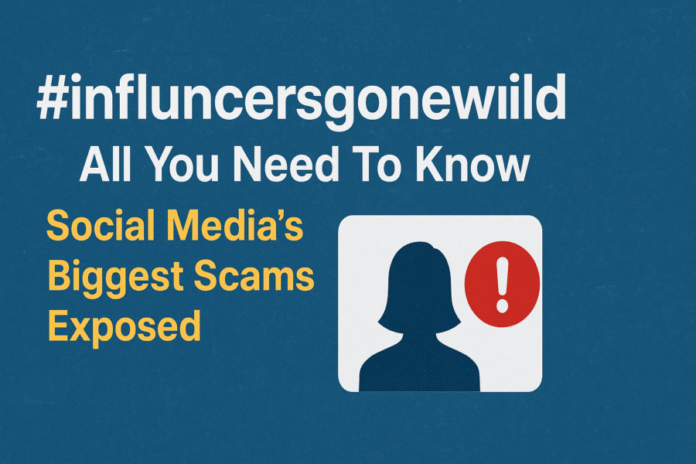In the ever-evolving world of social media, trends come and go, but some leave a darker mark than others. One such trend making waves—and raising eyebrows—is influncersgonewild. At first glance, the term may sound like just another viral sensation, but a closer look reveals a more troubling reality. This movement highlights a surge in influencer scams that have been misleading followers, promoting questionable products, and, in some cases, costing people money.
If you’ve been curious about influncersgonewild and what it really means, you’re not alone. Let’s dive deep into the origins, controversies, and red flags associated with this viral trend—and what you can do to protect yourself from falling victim.
What is influncersgonewild?
Influncersgonewild is a term that gained traction on social platforms like TikTok, Instagram, and Twitter. It is a play on the term “influencers gone wild,” used to describe social media influencers who push boundaries—often in unethical or outrageous ways—to gain attention, followers, and profits.
However, the trend has taken a more controversial turn. It has become synonymous with scams, fake giveaways, and misleading promotions that many influencers are now being called out for. It’s no longer just about risqué content or shock value—now it’s about deception and manipulation.
The Rise of Influencer Scams
In recent years, the influencer marketing industry has exploded. According to Forbes, the industry is worth over $21 billion globally. While this has opened up numerous opportunities for brands and content creators alike, it has also made room for exploitation.
Here’s how the scams typically unfold under the influncersgonewild umbrella:
1. Fake Giveaways
Influencers announce huge giveaways—often promising luxury items like iPhones, vacations, or cash prizes—but there’s a catch. You have to follow a dozen accounts, tag friends, or even pay a small fee to “qualify.” The winners? Rarely announced. In most cases, no one receives anything.
2. Shady Product Promotions
Ever seen influencers promoting “miracle” skincare, weight loss teas, or investment apps? Some of these products are either subpar, ineffective, or worse—completely fraudulent. Influencers cash in with affiliate deals, while their followers are left with buyer’s remorse.
3. Paid Subscriptions to Deceptive Content
Another tactic involves pushing followers to subscribe to private content via platforms like OnlyFans, Patreon, or exclusive Discord servers. The problem? The content doesn’t match expectations, and refund policies are often non-existent.
Red Flags to Watch For
If you’re following influencers or come across a viral influncersgonewild post, here are some signs to be cautious of:
-
🚩 No Transparency: They don’t disclose that a post is sponsored or part of an affiliate program.
-
🚩 High Entry Giveaways: Requiring excessive steps to join giveaways—especially payments.
-
🚩 Too-Good-To-Be-True Offers: Miracle cures, “get rich quick” schemes, or luxury prizes for little effort.
-
🚩 Lack of Reviews: Promoted products or services with zero or mostly negative user reviews.
The Impact on Followers and Trust
The fallout from these scams is more than financial. Followers feel betrayed, trust in influencer marketing erodes, and genuine creators suffer backlash. For example, many smaller influencers who work ethically find it harder to grow when the public becomes skeptical of all influencer promotions.
The influncersgonewild movement has, in some ways, helped shed light on these problems. By exposing scams and unethical practices, it forces influencers to be more transparent and encourages followers to be more discerning.
How to Protect Yourself Online
You can avoid falling into the trap of influncersgonewild scams by practicing digital vigilance:
-
Research: Google the product, read reviews, and check third-party sites before making purchases.
-
Check Disclosures: Ethical influencers will always disclose sponsorships or paid partnerships.
-
Report Fraud: If you come across misleading promotions, report them to the platform or relevant consumer protection agency.
-
Trust Your Gut: If something feels off or too good to be true—it probably is.
The Future of Influencer Accountability
As more followers become educated about the influncersgonewild phenomenon, platforms are also stepping up. Instagram and TikTok have implemented stricter ad disclosure rules, and some brands are now vetting influencers more thoroughly before collaborations.
This push toward accountability may be the silver lining. By raising awareness and demanding ethical behavior, we as users can help reshape the influencer landscape into one that’s safer, more honest, and truly beneficial for everyone.
Final Thoughts
The term influncersgonewild might have started as clickbait, but it’s now a powerful warning sign of how influencer culture can be misused. From fake giveaways to dodgy product promotions, it serves as a cautionary tale in the digital age.
Staying informed is your first defense. Follow people who add real value, promote transparency, and respect their audience. Let’s hold influencers accountable—not just for their content, but for their impact.


